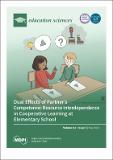Dual Effects of Partner’s Competence: Resource Interdependence in Cooperative Learning at Elementary School

Type de référence
Date
2021-05Langue de la référence
AnglaisEntité(s) de recherche
Université de GenèveRésumé
A partner’s competence should logically favor cooperative learning. However, research in cooperative learning has shown that a partner’s competence may or may not activate a threatening social comparison and yields dual effects: It is beneficial when students work on complementary information while it is detrimental when students work on identical information. Two studies conducted at elementary school (study 1 with 24 fourth graders working on encyclopedic texts, and study 2 with 28 fifth graders working on argumentative texts) replicated that interaction: Information distribution (complementary vs. identical information) moderated the relationship between partner’s competence and pupils’ learning outcomes. The relation between partner’s competence and students’ performances was positive when working on complementary information, but negative when working on identical information. A third study confirmed that working on identical information led to a competitive social comparison whereas complementary information reinforced the pupils’ cooperation perception. Contributions to cooperative learning research are discussed in terms of the competitive comparisons that may arise during cooperative learning at elementary school.Titre du périodique
Education SciencesMaison d’édition
MDPIPays d'édition
Suissee-ISSN
2227-7102Volume / tome
11Fascicule
5Pagination
1-17URL permanente ORFEE
http://hdl.handle.net/20.500.12162/5518Autre(s) URL(s) permanente(s)
http://doi.org/https://doi.org/10.3390/educsci11050210La publication existe uniquement sous forme électronique
ouiDocument(s) associé(s) à la référence
Texte intégral :
Fichier
Accès
Commentaire
Version
Taille
- Tout ORFEE
- Détail référence



